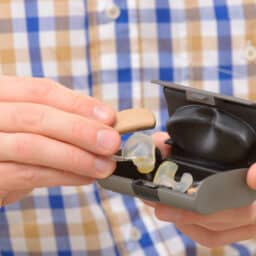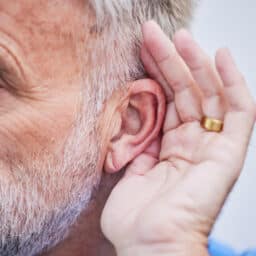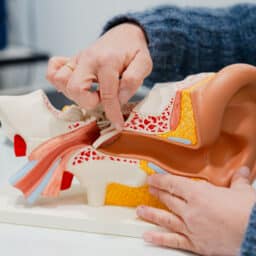Can I Sleep, Shower And Exercise While Wearing Hearing Aids?

An estimated 28.8 million U.S. adults could benefit from the clear communication hearing aids have to offer. One of the most common questions new hearing aid wearers have is when to wear them and when to take them off. Let’s dive into three key scenarios people often ask about: sleeping, showering and exercising. Sleeping It’s…
Hearing-Friendly Thanksgiving: Tips for Managing Noise at Large Gatherings

From the moment you start boiling water for mashed potatoes to when you’re wrangling kids and grandkids for an after-dinner movie, Thanksgiving is a noisy event. This constant noise can make the holiday a challenging event for people with hearing loss. But don’t worry. There are a few ways you can make your Thanksgiving gatherings…
New Research Genomes Shows Promise in Restoring Auditory Function

According to the World Health Organization, by 2050, approximately 1.5 billion people are projected to experience some level of hearing loss. A significant cause of this is damage to the inner ear’s hair cells, which are essential for converting sound into signals that the brain can understand. These cells are highly sensitive, and damage from…
Recognizing Teen Hearing Loss: Key Signs You Shouldn’t Ignore

Hearing loss isn’t just a concern for older adults; it can also impact teenagers. With nearly 5.2 million children and teens experiencing noise-related hearing loss, it’s essential to stay alert to the warning signs. The constant exposure to loud music through headphones, noisy environments like concerts and even everyday factors like ear infections or physical…
Understanding Conductive Hearing Loss: Causes and Management

Being diagnosed with hearing loss can be overwhelming, but understanding the type and cause of your condition is the first step toward effective treatment. Conductive hearing loss, which affects the outer or middle ear, is one of the three main types of hearing loss, alongside sensorineural and mixed. Let’s explore the common causes of conductive…
How Does Hearing Change Over Time?

Our hearing ability allows us to communicate and stay engaged with others. However, as we age, our hearing ability naturally declines due to a condition known as presbycusis. Understanding why this happens and recognizing the signs can help manage and mitigate its effects, maintaining a better quality of life. What is Presbycusis? Presbycusis, also known…
How Does Sleep Affect Your Hearing

Quality sleep plays a vital role in our overall health, influencing various aspects ranging from cognitive performance to cardiovascular well-being. Recent research has unveiled a connection between sleep quality and hearing loss, underscoring the significance of adequate rest. Let’s explore a few illustrative examples. Sleep Duration and Hearing Loss A study published in November 2023…
Active Listening Strategies for People with Hearing Loss

Active listening is a valuable skill that involves fully engaging in a conversation to understand the speaker better. This is particularly beneficial, as approximately 20% of the global population experiences some form of hearing loss. For them, active listening isn’t just a good habit; it’s a vital technique to enhance communication. Enhancing Communication with Active…
Coping with Worsening Tinnitus: Understanding Causes and Finding Relief

Tinnitus, the perception of ringing or buzzing in the ears, is a prevalent issue affecting approximately 50 million people in the United States. While some may experience it infrequently and without much bother, it can become a constant companion for others. Tinnitus is not a static condition. While you may have previously experienced it in…
Tips For Dating With Hearing Loss

Tackling the dating scene comes with its set of hurdles, and for individuals experiencing hearing loss, these challenges can become more pronounced. Approximately 15% of adults in the U.S. report some degree of hearing difficulty, making hearing loss a shared experience for many. Hearing loss can complicate conversations, especially in locations with background noise, such…